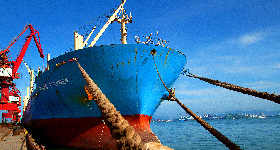公司简介
Company Profile
上海新乔保险经纪有限公司是经中国保险监督管理委员会批准成立的全国性保险经纪公司,注册资本金1000万元,公司总部位于上海外滩。
新乔专注于经营船舶船壳险、保赔险、租家责任险、货物运输险等海上保险的经纪业务。公司成立以来,新乔始终恪守“服务创造价值”的经营理念,以支持航运事业,发展航运金融为己任,为广大中国航运企业提供完善的风险管理解决方案和全过程的理赔服务。
作为客户的风险管理专家,新乔为客户提供全面风险识别和风险诊断,根据不同客户的风险特征辨证施治,为客户度身打造唯一的风险管理解决方案。“但有所托,全力以赴”,是新乔人对客户的郑重承诺。保险事故一旦发生,新乔承担帮助客户应对事故处理、向保险人提出索赔的责任,站在客户的立场上最大限度维护客户的正当权益,通过全程跟踪赔案,全力保障赔案处理的效率和效果。凭借丰富的赔案处理经验,新乔对客户的部分非保险责任纠纷案件,也提供免费咨询服务。新乔建立风险预警机制,对典型案例、行业动向、行业新规等定期以通函的形式及时通知客户,帮助客户最大限度规避经营风险。新乔的特色服务,已经成为公司的立足之本……
更多信息……新闻动态
News
- 2015年09月18 日 新乔为和润集团举办海上保险专题讲座
- 2015年09月08 日 关于新乔保险经纪公司企业定位的问答
- 2015年09月08 日 新乔开展海商海事及保险理赔知识培训
- 2015年08月14 日 新乔为国家援外港口建设工程项目提供经纪服务
- 2015年08月14 日 国际保赔协会、保险公司来访
- 2015年05月12 日 服务国家新能源发展战略--新乔为海上风电安装船提供保险经纪服务
- 2015年04月29 日 Charterama Asia Pacific Ltd 高管拜访
- 2014年11月26 日 EOM、QBE和MMIA分别拜会新乔
- 2014年11月08 日 Skuld P&I Club来访

















